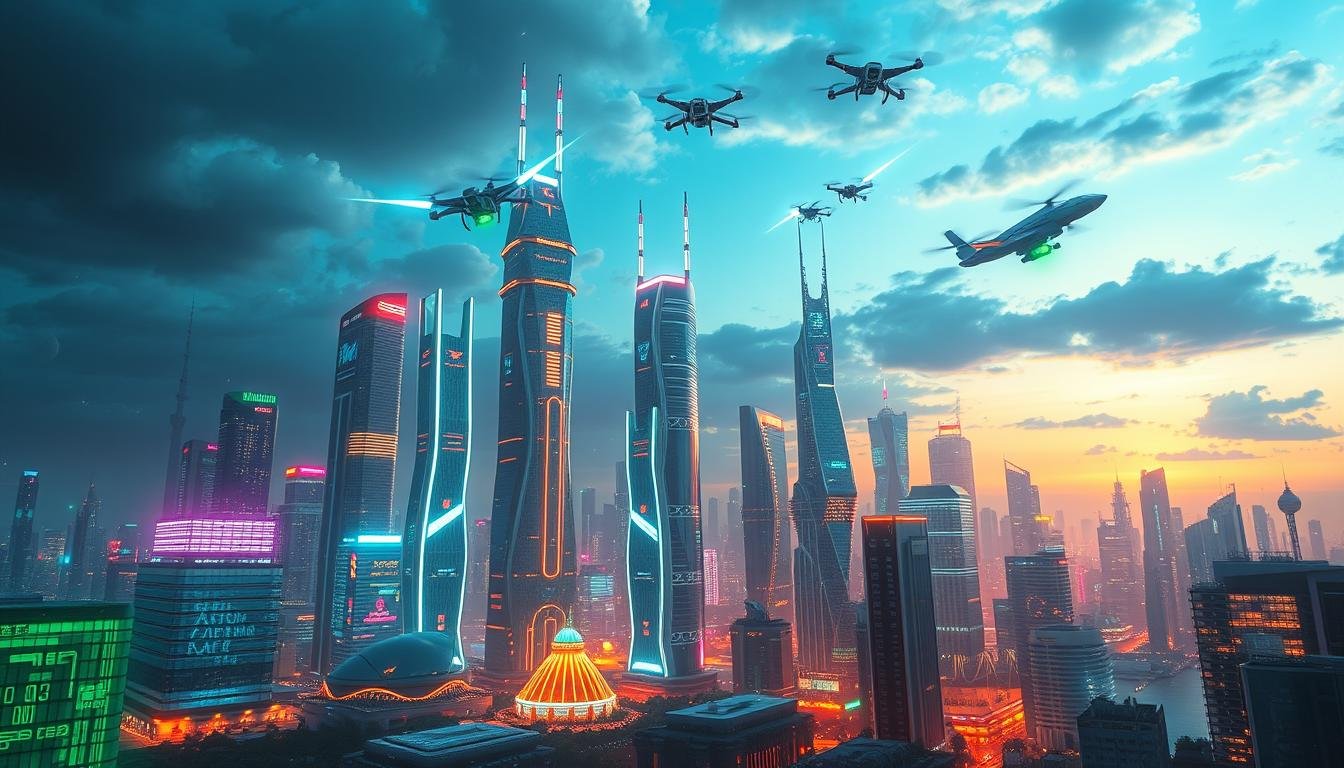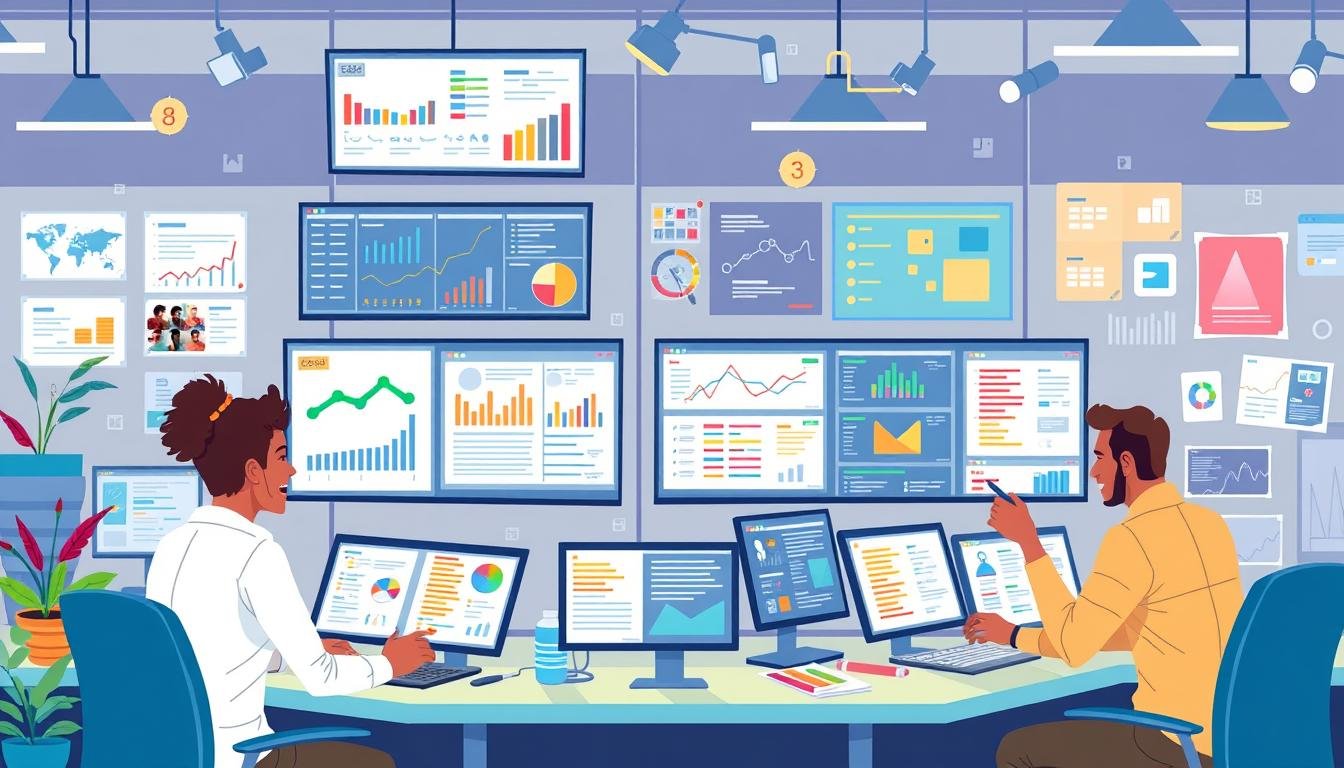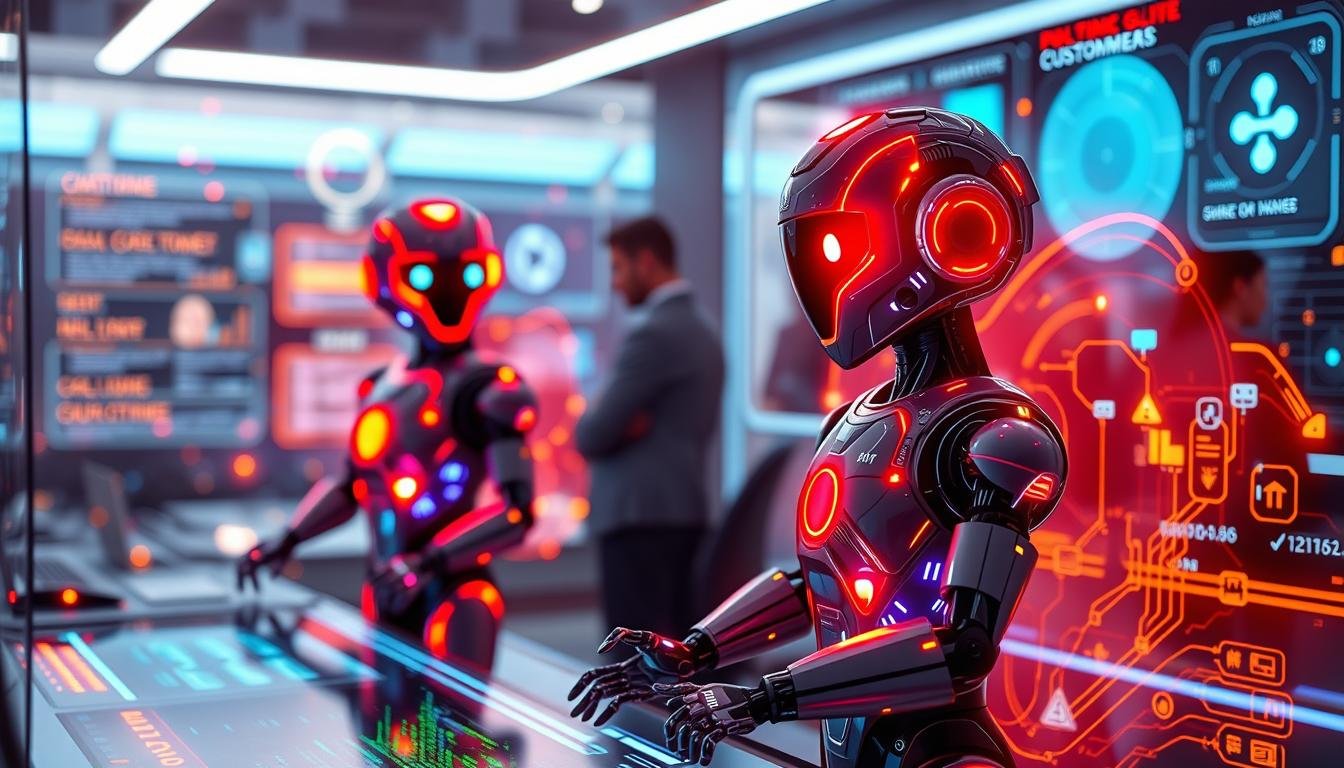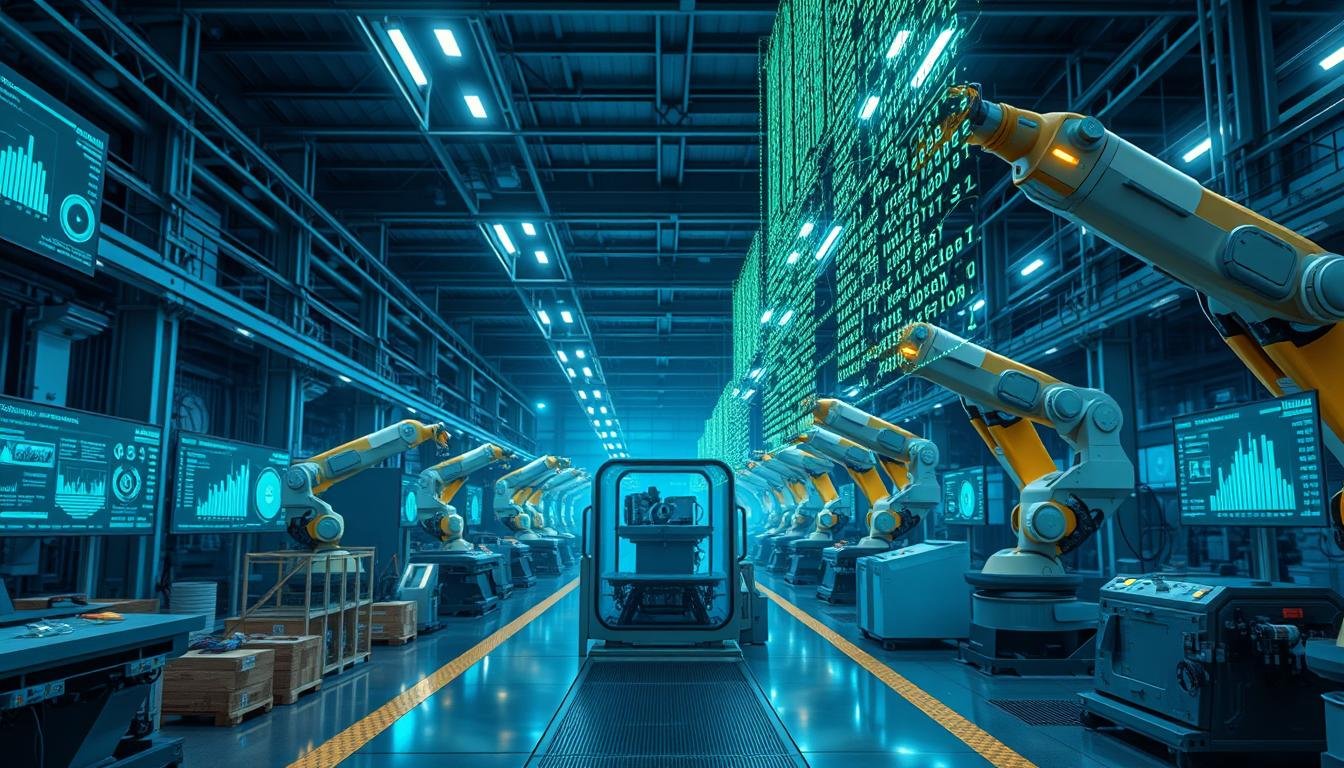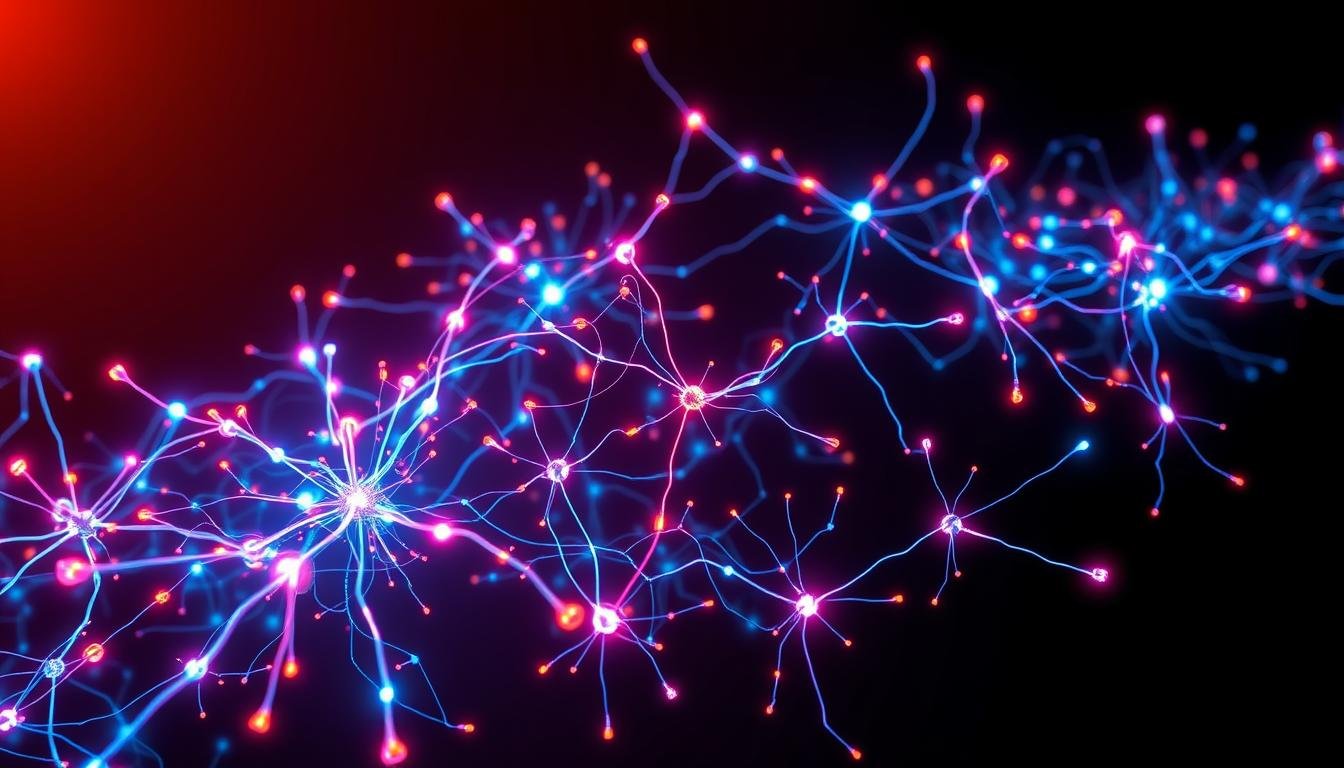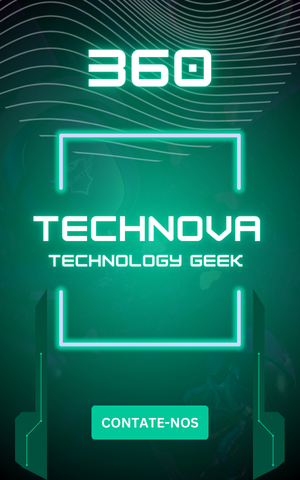The age of artificial intelligence (AI) is here, changing our world in ways we never thought possible. AI is now a big part of our daily lives, changing many industries and raising important ethical questions. As AI keeps getting better, it’s changing healthcare, transportation, finance, education, and entertainment. It’s key to understand how AI is shaping our future.
AI has made our lives easier, from virtual assistants to personalized content. It has become a big part of our lives. We need to see both the good and bad sides of AI.
Key Takeaways
- AI has become an integral part of our daily lives, transforming various industries.
- AI technology is enabling personalization, automation, and enhanced efficiency across sectors.
- Ethical considerations around AI, such as data privacy and bias, are growing concerns that require collaboration to address.
- The rapid advancements in AI are posing both opportunities and challenges for the future.
- Understanding the impact of the AI revolution is crucial for navigating the evolving landscape.
Let’s look at how AI has evolved, its uses, and the ethical issues it raises. We’ll see how AI is changing our future. Let’s explore the rise of artificial intelligence together.
The Evolution of AI
The story of artificial intelligence (AI) started in the 1950s. Pioneers like Alan Turing and John McCarthy set the stage. Turing’s work on machines that could think like humans was key. McCarthy named AI and started the Dartmouth Conference in 1956, marking AI’s beginning.
But, AI research hit roadblocks in the 1970s and 1980s. These “AI winters” saw less funding and interest. Yet, the early work laid the foundation for AI’s future.
The Resurgence
In the 21st century, AI saw a comeback. This was thanks to better computers, more data, and new machine learning methods. Neural networks and deep learning were especially important.
- A 2023 IBM survey found 42 percent of big businesses use AI. Another 40 percent are thinking about it.
- 38 percent of companies use generative AI, and 42 percent are thinking about it.
- About 55 percent of companies use AI, showing more automation.
- Almost one-third of tasks could be done by AI, affecting jobs.
- By 2028, 44 percent of workers’ skills might change because of AI.
- Women are more likely to work with AI, which could lead to skill gaps.
- AI might increase tech carbon emissions by up to 80 percent, affecting green efforts.
AI has changed many industries, like manufacturing, healthcare, and finance. It has also changed education, media, customer service, and transportation.
“Up to 30% of tasks in about 60% of jobs hold the potential for automation through AI’s prediction technology.” –
The journey of AI has been complex, with highs and lows. As we explore AI’s power, we must consider its ethical and social impacts.
AI in Healthcare
The healthcare industry is leading the charge in the AI revolution. AI is changing how we do medical diagnostics, personalized medicine, and drug discovery. It’s already being used in healthcare, and it’s making processes smoother from start to finish.
Diagnostics and Treatment
AI can look through lots of medical data, like images and genes, to spot diseases early. For example, Google’s DeepMind has made AI that finds eye and breast cancers as well as doctors do. This tech makes diagnoses faster and more accurate, leading to better care for patients.
Personalized Medicine
AI is also making personalized medicine possible. It looks at a patient’s genes, lifestyle, and environment to find the best treatments. This approach, called precision medicine, aims to tailor treatments to each person for better results.
Drug Discovery
AI is also changing drug discovery. It can predict how compounds will work in the body, speeding up the search for new drugs. This is key as healthcare needs more staff, especially doctors, due to high demand.
AI in healthcare will have a big impact. There are worries about ethics, jobs, and AI’s reliability. But AI’s benefits, like better care and research, are worth it. As AI gets better, it will work alongside doctors to improve health care.
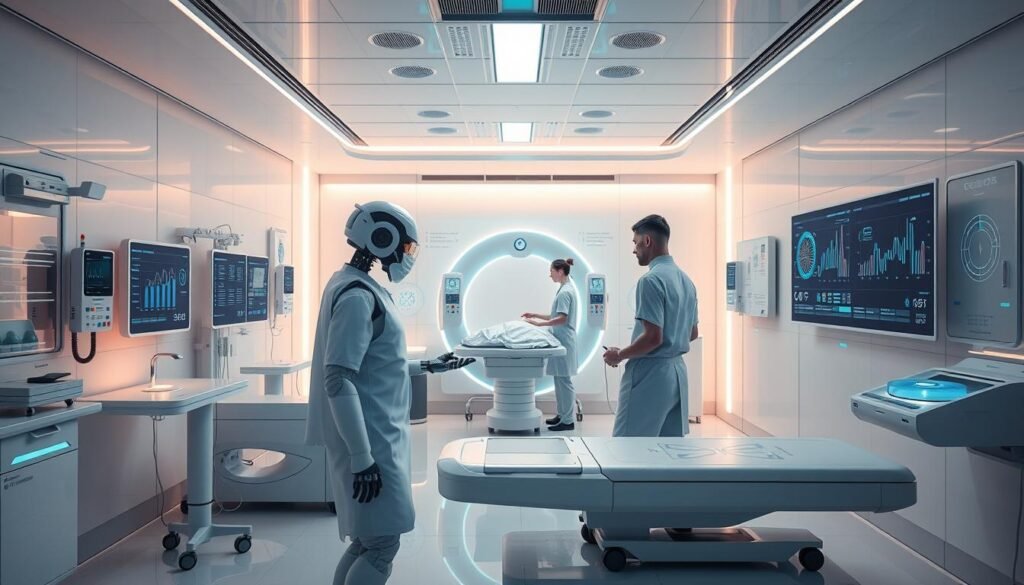
“AI systems are intended to complement rather than replace human clinicians in healthcare settings.”
AI in healthcare is still growing, with most products still being made. But AI’s power to change healthcare is clear, thanks to tech leaders and cloud computing.
The AI in healthcare market is expected to boom, reaching USD 6.6 billion by 2021. This growth will shape the future of healthcare with AI’s help.
By using AI, healthcare can get better at many things. This means better care for patients and a new era for the industry.
AI in Transportation
The transportation sector is changing fast thanks to AI. AI is making our travel safer and smarter. It’s all about self-driving cars and smart traffic systems.
Autonomous Vehicles
Self-driving cars, buses, and drones are big news in AI. Tesla, Waymo, and Uber are leading the way. They aim to make our roads safer and more efficient.
These vehicles use sensors and cameras with AI to move around. They can detect obstacles and ensure safety. This could change how we travel for the better.
Traffic Management
AI is also making traffic better. It looks at data from cameras and GPS to improve traffic flow. Cities like Singapore and Los Angeles are using this tech to make their streets smarter.
The future will see AI connect public transit, ride-sharing, and self-driving cars. This will change how we move around cities.
AI’s role in transportation will keep growing. It will make travel safer, smoother, and better for the environment. AI is leading us to a more sustainable future.
“The future of transportation is autonomous, connected, and sustainable – and AI is the key to unlocking this vision.”
AI in Finance
The finance world has quickly adopted AI technology. This is because AI is changing how banks work. It helps with fraud detection, makes trading faster, and offers better banking services. The impact of AI in finance is.
Fraud Detection: AI’s Watchful Eye
AI is key in fighting fraud in finance. It looks at many transactions to spot fraud. This helps banks keep their customers safe.
Wells Fargo is using AI to catch fraud in payments.
Algorithmic Trading: The Speed of AI
AI makes trading faster and more efficient. It quickly analyzes market data to make trades. This has changed the financial markets.
But, there are worries about market stability and risks from AI in trading.
Personalized Banking: AI-Driven Customer Experience
AI is making banking better for customers. Chatbots help 24/7, and AI gives financial advice based on spending habits. It also checks social media for customer feedback.
As AI grows in finance, we’ll see big changes. The future of finance is all about AI, bringing huge benefits.
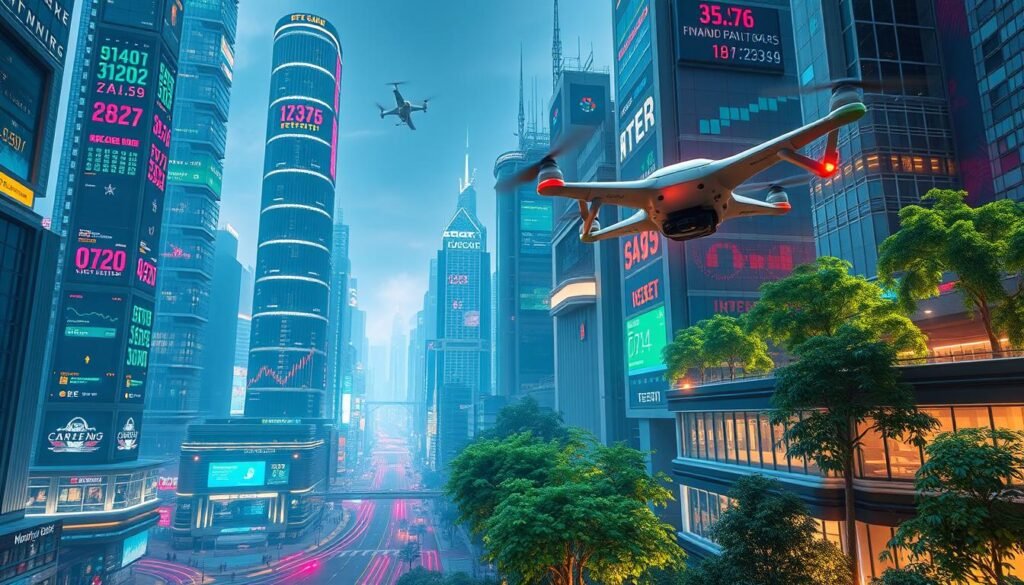
AI in Education
The world of education is changing fast, thanks to artificial intelligence (AI). AI makes learning personal by adjusting to each student’s needs and pace. Companies like Khan Academy and Coursera use AI to make learning fun and effective for everyone.
AI does more than just change how we learn. It also makes school work easier by handling tasks like grading and keeping records. This lets teachers spend more time teaching and talking to students. It makes learning better for everyone.
Personalized Learning
AI is making learning personal. It uses smart algorithms to understand each student’s learning style and pace. This way, learning becomes more fun and effective for everyone.
Administrative Efficiency
AI also makes school work easier. It can do tasks like grading and keeping records, freeing up teachers’ time. This lets them focus on teaching and helping students.
AI tools also help students with disabilities by making learning accessible. It breaks language barriers, making education open to everyone worldwide.
“AI is transforming education, from personalized learning experiences to streamlined administrative tasks. It’s an exciting time for both students and educators as we embrace the potential of this technology.”
As AI becomes more common in schools, it’s important for everyone to work together. We need rules to make sure AI is used wisely and safely. This will protect students while using AI to improve learning.
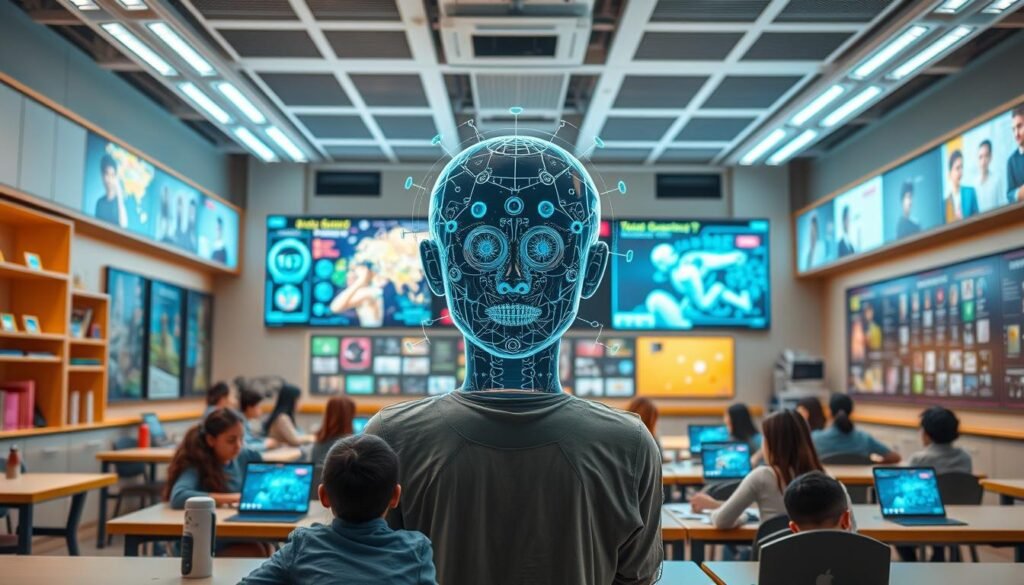
AI in Entertainment
The entertainment world is changing fast with the help of artificial intelligence (AI). AI is making content better, more personal, and fun for everyone. It’s opening up new ways to create art, making things faster, and giving fans just what they want.
Content Creation: AI-Powered Creativity
AI is changing how we make content in entertainment. Tools like OpenAI’s GPT-3 can write like a human, helping creators try new things and work faster. It’s also making 3D models and animations look real, making movies and games feel more real.
Personalization and Recommendations: Tailoring the Experience
Streaming services use AI to suggest shows and music just for you. AI looks at lots of data to guess what you’ll like, making sure you’re happy and engaged.
Virtual and Augmented Reality: Immersive AI-Powered Experiences
AI is making VR and AR better, making games and shows feel more real. AI characters and scenes change with what you do, making things more fun and lifelike. As AI gets smarter, we’ll see even more cool and personal experiences that mix the real and digital worlds.
AI is changing entertainment in big ways. It’s making content more personal and fun, from recommendations to virtual reality. AI is making entertainment better for everyone around the world.
The Ethical Implications of AI
Artificial intelligence (AI) is growing fast, and its ethics are clear. Privacy, bias, and jobs are all at risk. We must think deeply about AI’s impact and develop it wisely.
Privacy Concerns
AI gathers lots of personal data, which worries many. The way this data is used is often unclear. This has made people lose trust. We need strong privacy laws and clear AI use to fix this.
Bias and Fairness
AI’s fairness depends on its training data. If the data is biased, AI can spread these biases. This can harm in jobs, loans, and law. We must tackle AI bias to make it fair.
Job Displacement
AI worries us about losing jobs, as it can do many tasks. But, it also opens new tech jobs. Training workers for these new roles is key to lessening job loss.
As AI changes our world, we must tackle its ethics. We should focus on privacy, fairness, and worker welfare. This way, AI’s benefits can be shared fairly and responsibly.
“The greatest challenge with AI is not technological, but ethical – how to ensure that as AI becomes more powerful, it also becomes more aligned with human values and interests.”
– Toby Walsh, Professor of AI at the University of New South Wales
The Future of AI
The future of AI is bright, with new advancements on the horizon. Currently, AI is mainly used for specific tasks. But, new areas like natural language processing and computer vision are opening up new possibilities. By 2030, AI is expected to perform even better in many fields.
It’s important to focus on how we use and update AI systems. This ensures they work well with humans as we rely on them more.
Continued Advancements
AI research is moving forward fast, bringing us more advanced systems. In India, AI can help with the lack of doctors and healthcare resources. It can improve health care and find new medicines.
By 2025, AI will change how we travel, making cars and traffic smarter.
Human-AI Collaboration
AI will help humans, not replace them, making decisions and solving problems better. In finance, AI is already beating human managers in some areas. Young investors are turning to AI for their money advice.
By working together, humans and AI can solve big challenges and make new discoveries.
Regulatory Frameworks
As AI grows, we need strong rules to protect us. These rules should cover privacy, fairness, and who’s accountable. By 2030, AI could change how we interact with each other and the world.
We need to work together globally to make sure AI is used right. This will help us all benefit from its power.
The future of AI is full of promise, ready to change our world in big ways. As we explore this new territory, we must be careful, work together, and innovate responsibly.
The Rise of Artificial Intelligence: How AI is Shaping Our Future
Artificial intelligence (AI) is changing our world in big ways. It’s making healthcare, transportation, finance, and education better. AI revolution brings new tech like machine learning, natural language processing, and neural networks. This is making our lives and work better.
Experts say AI will make jobs like medicine and policing better by 2030. AI is already making our work and free time better. We expect even more improvements in the next ten years. AI might even beat humans in some tasks, like finding cancer from images.
We need to think about the right way to use AI. We must fix AI’s biases and make sure it’s clear how it works. We also need to figure out the law for AI in areas like art and health.
The future of AI looks good, but we must face its challenges wisely. As AI use grows, with 53 million papers checked by AI since spring 2023, we must share its benefits fairly. We aim for a future where AI makes life better for everyone.
“The rise of artificial intelligence is not just a technological advancement, but a societal transformation that will shape our collective future.”
Conclusion
We are at the start of an AI-driven era, and it’s changing our future in big ways. AI can now make decisions on a large scale, offering both great chances and big risks. It can create fake videos or make choices that harm us. But, with the right steps, AI can help make our world better and fairer for everyone.
To make the most of AI, we need to tackle its ethical side. AI systems can learn from old data, making biases worse. This shows how important it is for governments to guide AI’s growth. Also, teaching AI basics in schools is key to getting ready for an AI-filled future.
The AI research world must share their work clearly with everyone. By talking about AI’s risks and benefits, we can understand it better. This way, we can develop AI responsibly. Success in AI should mean making life better for everyone, not just machines.
